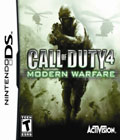Genre: FPS
Publisher: Activision
Developer: Infinity Ward
Release Date: November 6, 2007
A fair number of gamers saw Ridley Scott's stunning, horrifying film "Black Hawk Down" and said — rather than whispering a prayer, God save me any fate such as that — Hey, I want to play that. Not too long after the film was released, they could. In a way. Sort of. A licensed military shooter called Black Hawk Down was released for the PC. Though the setting and some of the key elements were the same, you couldn't truly play "Black Hawk Down" — the game wasn't the film; it was an average tactical military shooter in a realistic environment.
Today, you can indeed play "Black Hawk Down" on the PlayStation 3, under the name of Call of Duty 4: Modern Warfare. Developed by Infinity Ward, the original studio behind the World War II titles of the brand name that was first released for PC and then, in a deluge of varied versions of sequels, for consoles and PC, Call of Duty 4 is essentially the "Black Hawk Down" for which you were looking.
Of course, the setting is not the same. The plot is purely fictional. The troops are both British SAS and United States Marine Corps. But in the context of a cinematic military shooter experience in a video game, Call of Duty 4 brings you all the grave chaos of Scott's popular and critically acclaimed film.
Call of Duty 4 is by far the best cinematic military shooter ever released. The term "cinematic" is extremely significant here. Call of Duty 4 is not a tactical shooter; it's certainly not a strategic military title. It is, especially in the short yet not brief single-player campaign, a roughly eight-hour fight to stay alive by you and your squadmates, your allied combatants. Staying this side of giving too much away, not all of you are going to make it, either. In terms of gameplay, very little you do matters. Save for the fact your assault team's forward movement is sometimes triggered by your arrival at waypoints, and also that you are often assigned the key role in objective tasks, like planting and detonating C4, you could hide behind a wall the whole time, and your actions would have no influence on the outcome of the game. Indeed, on the campaign's higher difficult settings, this would be the smartest decision you'll ever make in a game. Otherwise, you're going to die.
You're going to die because this is real combat. This is not a heavily armed and armored, near-impervious tactical squad sweeping a logically laid-out, intact modern office tower, sniping nefarious terrorists or bad-guy bank robbers as they are encountered in small numbers. Call of Duty 4 is real combat, in the streets, up a wooded mountainside, in depopulated disaster areas — or, as mentioned, the cinematic equivalent thereof. In fact, Infinity Ward could be maligned or applauded, depending on your perspective, for making an adamantly anti-war video game: the point driven home not by running around spray-painting peace symbols on walls, as in some experimental efforts, but instead in actually fighting through it. If you play even a couple of hours of Call of Duty 4 on a more difficult setting and say to yourself, Gee, I'd like to go to do that for real, there is something badly wrong with you. Call of Duty 4 also succeeds in conveying an appreciation, perhaps a sense of awe about, the men and women who do really go do these things.
Call of Duty 4's cleanly composed but hardly stellar plot is based on a cross-up between the lately popular themes of post-Cold War former-Soviet republics and Arab terrorists. The knot tied between them: For construction of nuclear bombs, the importation of leftover, perhaps forgotten fissionable material from Chernobyl, Ukraine, evacuated 20 years ago during the catastrophic failure of a local nuclear power plant. For you, in the game as an SAS trooper or U.S. Marine, the overarching plot is rather insignificant, just as it didn't matter much to the foot soldiers the business in the Vietnam War of taking Hill 112 only to be directed leave it to NVA reoccupation, and then, a cog in some machine of a master plan, being ordered again a week later to take back Hill 112. Your job in Call of Duty 4 is to shut your mouth and do your job, and should you survive, more the better for you.
Lending incredible verisimilitude to the cinematic feel of the title are just stunning, truly realistic graphics and multichannel audio on PlayStation 3. The game's graphics — from the environments, to the vehicle and character models, the weapons, the projectile impacts and detonations, the smoke, the flying bits of debris — it's all absolutely jaw-dropping. There is no question this is the best-looking shooter in the history of console shooters. It's almost surely the best-looking console game to date. (My wife, not uncommonly for wives, is not much into shooting things, and less into wrangling with the controls of console FPS titles, but often as I played Call of Duty 4 she'd wander by, perch on the sofa's edge staring at the television as if rather than playing a game, I was watching raw footage of the invasion of Baghdad filmed by embedded journalists, broadcast to the world on CNN.) Show me a visually more perfect title, and I'll show you a game not set to release for many months, or even years.
The title's control scheme is easy, responsive and so rapidly learned I don't even recall ever not knowing the button assignments. Movement is smooth and graceful, and again, highly realistic. The only complaint with the control mechanism, a minor thing, was the very, very infrequent loss of contact between the Bluetooth SixAxis controller and the PlayStation 3, something I've run across before — notably, always in FPS titles. In this game, the hitch is so rare and recovers so quickly it doesn't interfere with gameplay; I didn't die once because of it, even when it happened in the middle of a harrowing firefight.
Extending the life of the single-player game, Infinity Ward designed an "arcade mode," unlocked by completing the campaign on any difficulty, including the relatively easy "recruit" setting. Although once you've completed the campaign, you can go back and replay any mission at any difficulty, "arcade mode" adds racking up points, almost literally like a Pac-Man machine, for kills within the campaign missions. Frankly, in the context of Call of Duty 4, this extra mode doesn't belong. The title is otherwise too serious, too realistic, too bloody lethal, to slap in a jokey emulation of an arcade machine. It's almost in poor taste. And as for extending the life of the single-player game, via the feature allowing selective replay of campaign missions as they were originally presented, that's quite enough. One mission near the end of Act II, I'll gladly play over and over again, quite possibly for years, on the highest difficulty setting. It's that fascinating. It's that real.
Call of Duty 4 includes incredibly robust multiplayer features. There are about a dozen different game modes and numerous maps, as well as "challenges" that unlock additional equipment and weaponry, and also a mechanism for defining your own unique soldier classes, outfitted with particular load-outs you define and saved for ready access. To motivate, and to weed out the serious players from the more casual types, the more unique and difficult modes of play, as well as most of the heavy weapons and many of the challenges, are unlocked only by increasing in online rank. Rank increase is rapid at first, slows down, but still is not so onerous that anyone interested in full access to all the included modes can't spend some regular time with the online game and eventually rank-up high enough to play as he chooses. The only problem with this system is that the loftier, more interesting and sometimes more peculiarly Byzantine game modes depend on a quantity of players possessing enough interest in the game to rank up so there are plenty of players to make these kinds of matches available and well-populated. Fortunately, Call of Duty 4 will surely maintain this sort of player interest.
Visually, the game suffers little in multiplayer over its single-player incarnation. And on top of so many varied modes, challenges and soldiering roles to play, there are various host-defined settings for multiplayer matches, conditions so particular as allowing only head-shots for kills. The worst part of online multiplayer in Call of Duty 4 is that still too few PlayStation Network players own or use microphones for their PS3s, but this is a problem for any online title for the console, especially those with team-based modes.
 Call of Duty 4 is a great multiplayer game and a very, very good single-player campaign — save the "arcade mode," which is just unfortunate, though I'm sure well-intended — but its greatest triumph in single-player is also the title's greatest flaw: Some people won't consider it so much a game, not in the way they're accustomed to military shooters. That's because it's not absolutely, perfectly a video game in the single-player aspect. Call of Duty 4: Modern Warfare is first and foremost an experience, an experience of real combat presented with the cinematic qualities of top Hollywood films. This will undoubtedly put off some players. There's no accounting for taste, I suppose, but it's a valid consideration, some avid genre gamers won't get that this title's design is a lot less about completing an objective to progress to new objectives, to ultimately beat the game, and a lot more about dying because you stood up at the wrong time — which, for some of you, may be just exactly the insensible way your grandfather, uncle, cousin or sister died. Call of Duty 4 is one of the most important console games in the past decade, and it's certainly one of the finest, as well.
Call of Duty 4 is a great multiplayer game and a very, very good single-player campaign — save the "arcade mode," which is just unfortunate, though I'm sure well-intended — but its greatest triumph in single-player is also the title's greatest flaw: Some people won't consider it so much a game, not in the way they're accustomed to military shooters. That's because it's not absolutely, perfectly a video game in the single-player aspect. Call of Duty 4: Modern Warfare is first and foremost an experience, an experience of real combat presented with the cinematic qualities of top Hollywood films. This will undoubtedly put off some players. There's no accounting for taste, I suppose, but it's a valid consideration, some avid genre gamers won't get that this title's design is a lot less about completing an objective to progress to new objectives, to ultimately beat the game, and a lot more about dying because you stood up at the wrong time — which, for some of you, may be just exactly the insensible way your grandfather, uncle, cousin or sister died. Call of Duty 4 is one of the most important console games in the past decade, and it's certainly one of the finest, as well.
Score: 9.4/10
More articles about Call of Duty 4: Modern Warfare











 Call of Duty 4: Modern Warfare delivers amazing special effects, including use of depth of field, rim-lighting, character self-shadowing, real time post-processing, texture streaming as well as physics-enabled effects to enlist players into the most photo-realistic gaming experience yet.
Call of Duty 4: Modern Warfare delivers amazing special effects, including use of depth of field, rim-lighting, character self-shadowing, real time post-processing, texture streaming as well as physics-enabled effects to enlist players into the most photo-realistic gaming experience yet.



































